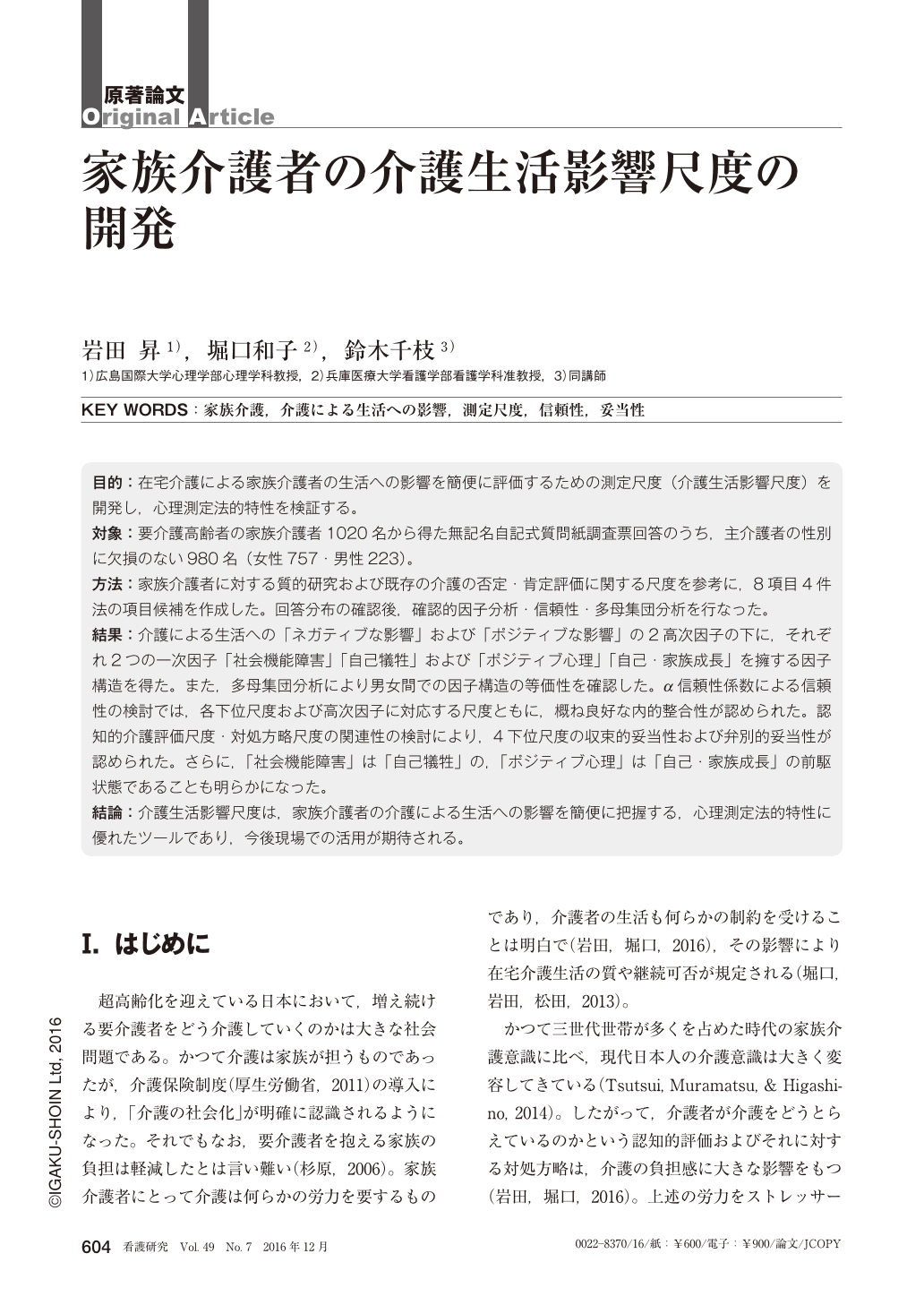Japanese
English
- 有料閲覧
- Abstract 文献概要
- 1ページ目 Look Inside
- 参考文献 Reference
目的:在宅介護による家族介護者の生活への影響を簡便に評価するための測定尺度(介護生活影響尺度)を開発し,心理測定法的特性を検証する。
対象:要介護高齢者の家族介護者1020名から得た無記名自記式質問紙調査票回答のうち,主介護者の性別に欠損のない980名(女性757・男性223)。
方法:家族介護者に対する質的研究および既存の介護の否定・肯定評価に関する尺度を参考に,8項目4件法の項目候補を作成した。回答分布の確認後,確認的因子分析・信頼性・多母集団分析を行なった。
結果:介護による生活への「ネガティブな影響」および「ポジティブな影響」の2高次因子の下に,それぞれ2つの一次因子「社会機能障害」「自己犠牲」および「ポジティブ心理」「自己・家族成長」を擁する因子構造を得た。また,多母集団分析により男女間での因子構造の等価性を確認した。α信頼性係数による信頼性の検討では,各下位尺度および高次因子に対応する尺度ともに,概ね良好な内的整合性が認められた。認知的介護評価尺度・対処方略尺度の関連性の検討により,4下位尺度の収束的妥当性および弁別的妥当性が認められた。さらに,「社会機能障害」は「自己犠牲」の,「ポジティブ心理」は「自己・家族成長」の前駆状態であることも明らかになった。
結論:介護生活影響尺度は,家族介護者の介護による生活への影響を簡便に把握する,心理測定法的特性に優れたツールであり,今後現場での活用が期待される。
Objectives : To examine psychometric properties of a newly developed measurement to assess perceived influence on life through family caregiving, consisting of eight items with a 4-point Likert scale, constructed by means of a qualitative research on family caregivers and some comprehensive measures for caregivers' cognitive appraisal.
Design and Participants : Based on cross-sectional questionnaire survey, response data were obtained anonymously from 1,020 primary caregivers, and 980 without missing the information on gender of age of primary caregivers (757 women and 223 men) were analyzed.
Results : After checking the response frequencies, a confirmatory factor analysis revealed the two higher-order components, such as “negative influence on life (NEG)” and “positive influence on life (POS)” through family caregiving, with each two underlying (first-order) components, i.e., “social dysfunctioning” and “self-sacrifice” under the NEG, and “positive feeling” and “self- & family growth” under the POS, respectively. The internal consistency reliabilities of all but one scale/subscales were at a satisfactory level. Multi-sample test confirmed the measuring equivalence of this scale between men and women. Structural equation modeling (SEM) analysis indicated the convergent and discriminant validity of the four subscales against caregivers' cognitive appraisal and coping strategies. Furthermore, SEM suggested that “social dysfunctioning” and “positive feeling” might be significant precursors to “self-sacrifice” and “self- & family growth,” respectively.
Conclusion : These findings suggests that this measurement is a convenient but psychometrically-sound tool to capture the caregiver's perception of positive and negative influences on life through family caregiving.

Copyright © 2016, Igaku-Shoin Ltd. All rights reserved.


